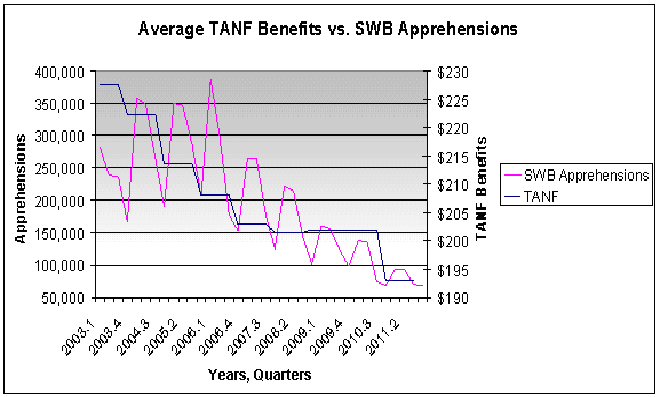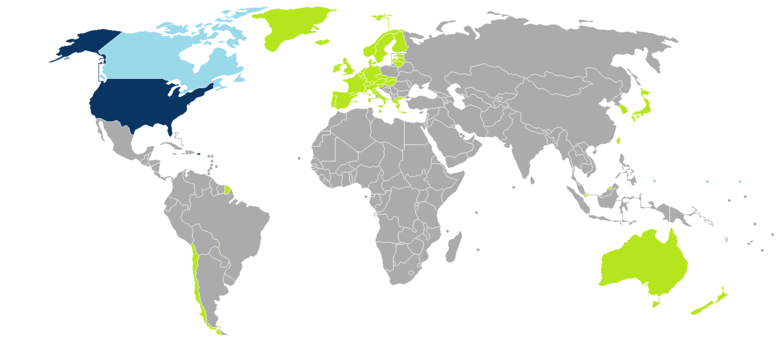This is a guest post by Ilya Somin, a professor of law at George Mason University and blogger at The Volokh Conspiracy (posts by Somin only). Somin has argued for substantially freer immigration, particularly in the context of immigration to the United States, on both moral and practical grounds. A list of some of his writings relevant to open borders can be found at the Open Borders page about Somin.
The US Constitution does not in itself tell us what kind of immigration policy is right and just. But it is relevant to debates over immigration in at least three important ways. First, some opponents of increased immigration mistakenly argue that the Preamble and other parts of the Constitution commit the US government to ignoring the potential benefits of immigration to would-be migrants themselves. Second, there is a strong case that the original meaning of the Constitution restricts Congress’ power to limit migration, though it does give Congress broad power to deny citizenship to migrants. Finally, some structural aspects of the Constitution help limit the potential “political externalities” of open immigration, thereby weakening claims that the only way to prevent immigrants from having negative effects on public policy is to keep them out of the country entirely.
I. The Constitution does not Justify Ignoring the Benefits of Immigration for Immigrants.
The Preamble to the Constitution states that the document’s purpose is to “form a more perfect Union, establish Justice, insure domestic Tranquility, provide for the common defence, promote the general Welfare, and secure the Blessings of Liberty to ourselves and our Posterity.” Some opponents of immigration claim that the inclusion of the phrase “ourselves and our posterity” suggests that the Constitution was only meant to benefit present US citizens and their descendants, thereby justifying the US government in ignoring the rights and welfare of potential migrants in making decisions on immigration policy. However, the term “posterity,” as used in the Preamble, is probably metaphorical rather than literal – denoting future residents of the United States in general rather than merely just those who were citizens in 1787 and their descendants. In the 18th century, as today, the word “posterity” was often used to denote “future generations” in general rather than merely the biological descendants of a particular group of people. In 1787, and for almost a century thereafter, the US had a virtual open borders policy, and the Framers of the Constitution had no intention of changing that. They knew that millions of immigrants would be among the “posterity” referred to in the Preamble.
Even if we assume that the “posterity” referred to in the Preamble really does refer only to those who were citizens in 1787 and their descendants, it does not follow that that the Constitution justifies ignoring the effects of immigration restrictions on would-be immigrants. As the Founding Fathers well knew, there are moral limits on what governments are allowed to do in pursuit of the interests of their citizens. For example, the United States has no right to invade Mexico and enslave its people – even if doing so would enhance “the general welfare” of Americans. Similarly, there are moral constraints on the extent to which the US government is justified in forcibly consigning would-be immigrants to lives of poverty and oppression in Third World countries. Neither the Preamble nor any other part of the Constitution states that the US government is entitled to ignore moral constraints on the means it uses to achieve the goals of the Constitution.
A closely related restrictionist argument is the claim that aliens are not entitled to the various constitutional rights enumerated in the Constitution. In reality, most of the rights guaranteed by the Constitution are extended to all persons who enter areas governed by the United States, whether citizens or not. As James Madison put it at the Virginia ratifying convention for the Constitution, “[I]t does not follow, because aliens are not parties to the Constitution, as citizens are parties to it, that whilst they actually conform to it, they have no right to its protection.” In the few cases where the Constitution really does protect only citizens, the term “citizens” is explicitly used, as in the Privileges and Immunities Clause of Article IV, Section 2. Such explicit references to citizens would be unnecessary if there was an implicit understanding that all constitutional rights are limited to citizens alone.
II. Congress’ Power to Restrict Immigration.
The detailed enumeration of congressional powers in Article I of the Constitution does not include any power to restrict migration as such, even though it does include the power to make laws concerning the “naturalization” of foreigners and “regulate Commerce with foreign Nations.” The Naturalization Clause does not create a power to prevent foreigners from entering the country. It merely allows Congress to set conditions for the grant of citizenship.
The scope of the power to regulate “commerce” has long been a source of controversy. But at the time of the Founding and for many decades thereafter, the dominant interpretation was that it merely gave Congress the power to restrict trade and other commercial transactions, not to forbid movement as such. The Commerce Clause also gives Congress the power to regulate interstate as well as international commerce. Yet few if any eighteenth and nineteenth century jurists would have argued that Congress therefore had the power to forbid Americans from moving from one state to another.
In recent years, some leading legal scholars have argued that the original meaning of the Commerce Clause gives Congress the power to regulate all “social interaction” that affects multiple states or foreign nations. But this interpretation would give Congress nearly unlimited power, and is inconsistent with the dominant original understanding that congressional power was intended to be strictly limited in order to limit infringements on the power of the states. For a more detailed critique of the interaction theory, see this article by Georgetown law professor Randy Barnett.
Congress can restrict the entry of some foreigners by using its other enumerated powers. For example, the power to declare war and to spend money for the “common defence” includes a power to forcibly restrict entry by enemy spies, terrorists, and soldiers. The power to “define and punish” offenses against “the law of nations” presumably allows Congress to restrict the movement of pirates and other violators of international law. But there is no general enumerated power giving Congress the authority to ban the entry of people simply because they are foreign nationals.
Not until the Chinese Exclusion Act of 1882 did Congress adopt a significant law banning migration as such, as opposed to restricting eligibility for citizenship or excluding individuals who posed a specific threat that Congress could address under one of its other enumerated powers. And, even then, there was considerable controversy over the law’s constitutionality, despite the fact that the Act was popular due to widespread anti-Chinese prejudice.
Modern Supreme Court decisions such as Gonzales v. Raich hold that Congress has the authority to regulate virtually any “economic activity” (defined broadly enough to cover most migration) and that it has “plenary” power to restrict immigration. It is unlikely that these doctrines will be reversed any time soon. Adherents of “living constitution” theories of constitutional interpretation can, consistent with their commitments, support this overriding of the text and original meaning. But professed originalists – who include many anti-immigration conservatives – are in a more difficult bind. This is especially true in light of the fact that conservative originalists have been in the forefront of those arguing for a narrow interpretation of Congress’ powers under interstate Commerce Clause. If the term “commerce” has a narrow definition when it comes to interstate commerce, the same applies to foreign commerce, since the Constitution literally uses the same word to cover both, giving Congress the power to “regulate Commerce with foreign Nations, and among the several States.”
A possible way out of this bind for originalists is the claim that the federal government has an “inherent” power to restrict international migration, regardless of whether it is explicitly enumerated in the Constitution. That was in fact the basis on which the Supreme Court upheld the exclusion of Chinese in 1889. But if the Constitution presumes such an inherent power to restrict migration, surely there is an equally inherent power to control naturalization. Yet Article I includes an explicit grant of the power to establish a “uniform Rule of Naturalization.”
Finally, even if Congress does have the power to exclude migrants for any reason it wants, nothing in the Constitution requires it to do so. The Constitution allows federal and state governments to do many things that are ill-conceived or unjust, and large-scale restrictions on immigration could be among them.
III. The Constitution and Potential Political Externalities of Immigration.
Sophisticated critics of immigration – particularly conservative and libertarian ones – often emphasize the problem of “political externalities:” the danger that immigrants will use the power of the vote to cause harmful changes in government policy. Several parts of the Constitution help restrict such dangers.
First, as noted above, the Naturalization Clause gives Congress the power to restrict migrants’ eligibility for citizenship. Under current law, most legal immigrants are eligible for citizenship only after five years, and only if they speak a modicum of English and can pass a citizenship test that many native-born Americans would fail. This ensures that immigrants will be at least partially assimilated before getting citizenship rights, and makes it less likely they would support laws that undermine core American values. If necessary, Congress could lengthen the waiting period for citizenship, make the test harder, or both. Living for many years in a nation that denies them citizenship rights may be unfair to immigrants. But most would prefer living as a non-citizen in a relatively free and prosperous society to life as a full citizen in poor and often oppressive Third World nations.
Second, the Constitution’s requirement that each state has two senators leads to overrepresentation of states with small populations. Most such states are relatively rural states far from the East and West coasts, and they tend to have few immigrants. The resulting overrepresentation of native-born citizens diminishes the relative power of immigrant voters, and thereby helps alleviate any political externalities they might cause. The Constitution also restricts most powerful elected offices to citizens, and allows Congress to restrict non-citizen eligibility for federal welfare programs.
The political effects of the Naturalization Clause and the Senate are double-edged swords. In some cases, immigrant voters might use their influence to improve American public policy rather than make it worse. When that happens, restrictions on eligibility for citizenship and overrepresentation of native-born citizens in the Senate turn out to be harmful rather than beneficial. But those who worry about the political externalities of immigration are likely to be pessimists rather than optimists in their assessment of the influence of of immigrant voters. Such pessimists should welcome the fact that the Constitution has many mechanisms for controlling such externalities without resorting the more draconian approach of banning migrants from entering in the first place, and thereby consigning many to a lifetime of misery in the Third World.
UPDATE: At the Originalism Blog, University of San Diego Law Professor Michael Ramsey raises an objection that has also been advanced by some commenters on this site:
Professor Somin argues, among other things, that the Constitution’s original meaning does not give Congress general power to restrict immigration…
I think his argument may well be correct. But if it is, I think it quite plainly leads to a result Professor Somin does not mention, and which the folks at Open Borders do not want hear: it would leave to the states the power to restrict immigration.
I agree that the states had the power to restrict immigration under the original 1787 Constitution. But matters are far less clear after the Fourteenth Amendment, which, among other things, restricts state government discrimination against aliens. As the Supreme Court pointed out in Plyler v. Doe (admittedly in an opinion written by non-originalist Justice William Brennan), several of the framers of the Amendment specifically stated that one of its purposes was to curb such discrimination.
But if it turns out that the price of limiting congressional power to restrict immigration is increasing state power to do so, that’s a tradeoff I’m more than happy to accept. Some states might choose to severely limit immigration, but – thanks to interjurisdictional competition – others will embrace it. And life in any American state is a far better deal for immigrants than being consigned to the Third World, which is the effect of federal laws banning migration.
UPDATE #2: Michael Ramsey’s colleague and co-blogger Mike Rappaport comments on this post here. Mike agrees with me that “the Constitution does not give Congress the power to regulate immigration as such.” But he also argues that Congress does have the power to regulate some other types of international movement, such as crossing international boundaries for commercial purposes. I largely agree. But such restrictions are a far cry from being able to ban mere migration across international lines.
Mike also raises the issue of state authority to impose migration, barriers, but concludes (as I do above) that state migration laws are unlikely to impede immigration as much as federal ones do, given interstate variation and competition. He does not address my point about the ways in which the Fourteenth Amendment might restrict state governments’ power to regulate migration.
Finally, Mike suggests that if the Supreme Court had struck down the Chinese Exclusion Act in the 1880s, Congress might have been given the power to ban immigration by constitutional amendment. That is certainly possible. But the Constitution is extremely hard to amend, and it is far from clear that the supporters of the Exclusion Act had the necessary two-thirds majority in both houses of Congress, plus winning the support of three quarters of state legislatures.
Related reading
These links have been edited by the Open Borders: The Case editorial staff and were not vetted by the author.
Other related material by the author: Obama, immigration, and the rule of law [updated with additional material on precedents for Obama’s action, and a response to Timothy Sandefur] by Ilya Somin, Volokh Conspiracy (Washington Post), November 20, 2014.
Related Open Borders: The Case blog posts:
- The Constitution, Citizenism, and the Natural Right of Migration by Chris Hendrix, November 13, 2012.
- Constitutionally entrenching migration as a fundamental human right: Argentina and open borders by John Lee, November 25, 2014.
- Is There a Downside to Presidential Nullification? by Nathan Smith, June 19, 2012.
- Citizenism and open borders by Michael Huemer, February 18, 2013.
- Immigration to US for whites only? by Chris Hendrix, July 18, 2013.
Relevant background material coverage on Open Borders: The Case:
The painting featured at the top of this post depicts the signing of the United States Constitution, and is available in the public domain.






